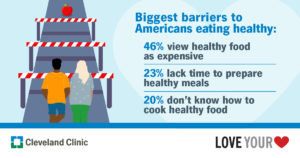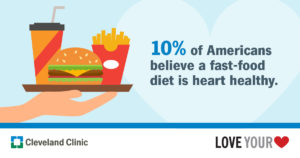A new survey from the Cleveland Clinic sheds light on some of the major challenges for maintaining a heart-healthy diet, with the cost of healthy food as the biggest barrier. As February marks American Heart Health Month, health officials are encouraging people to prioritize their overall well-being, but cost and accessibility are holding many back.
Cost and Access to Healthy Food
 According to the survey, 46 percent of Americans believe the cost of healthy food is the biggest barrier to eating healthy. Participants surveyed also cited a lack of time to prepare healthy meals (23 percent) and unfamiliarity with healthy ways of cooking (20 percent).
According to the survey, 46 percent of Americans believe the cost of healthy food is the biggest barrier to eating healthy. Participants surveyed also cited a lack of time to prepare healthy meals (23 percent) and unfamiliarity with healthy ways of cooking (20 percent).
Validating participants’ answers, a comprehensive review of 27 studies in ten countries found that unhealthy food is about $1.50 cheaper per day than healthy food. When feeding a large family, it generally costs less to buy from a dollar menu or purchase cheap, premade frozen dinners. Not to mention, unhealthy food tends to be more convenient and, while this is not always the case, taste better.
Related: Here’s Why the USDA Updated its Organic Food Regulations
Access to healthy food was also an issue, especially for minority communities. The survey noted that 20 percent of Black Americans say it was hard for them to access stores that sell healthy food compared to 15 percent of White Americans.
Food deserts and a lack of grocery stores continue to be a large issue in underserved communities. To help solve this persistent problem, the Cleveland Clinic broke ground on a $52.8 million grocery market and apartment complex in Fairfax, Cleveland back in 2021 to foster a healthier community by addressing food insecurity and supporting economic development in the neighborhood.
What is Considered Healthy Food?
The survey confirmed that there is still confusion amongst participants over what is considered healthy. Getting exercise and eating better are always a top priority, but the survey results show many are still misinformed and struggling to adapt.
For example, ten percent of Americans chose a fast-food diet as the most heart-healthy diet, with parents being two times more likely to choose it, and 45 percent of participants admitted to buying fast-food at least once a week. Additionally, 71 percent of Americans polled believed that moderate exercise had a greater impact on losing weight than diet.
“We know the large majority of heart disease is preventable through a healthier diet, regular exercise and not smoking, so we want to emphasize how important it is to make a heart-healthy lifestyle a priority for everyone,” said Samir Kapadia, chairman of Cardiovascular Medicine at Cleveland Clinic.
The Cleveland Clinic recommended the Mediterranean diet as a heart-healthy diet since it combines a mix of fresh fruits, vegetables, nuts, fish and oils. But due to the cost of healthy food and lack of access in many cases, it is recommended that people plan meals in advance, buy frozen fruits and vegetables, buy in bulk, cook in large batches and skip organic produce to save money.
The survey results come shortly after the American Academy of Paediatrics recommended intensive therapy for children as young as six and weight loss drugs and surgery for those in their early teens. While this recommendation could serve as a short-term remedy, access to affordable, healthy food could mitigate the need for such strong interventions.












Join or login to leave a comment
JOIN LOGIN